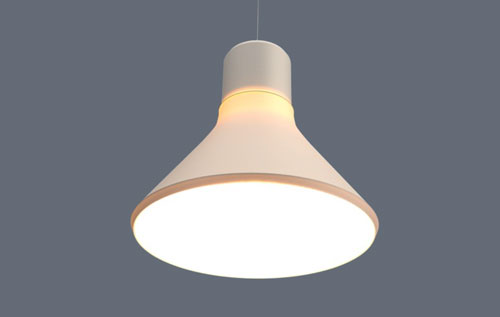3D printed luminaires are biodegradable

UK start-up LumiAdd has unveiled a range of luminaires printed in biodegradable plastic.
The Origin series of pendants is made from polyhydroxyalkanoate, or PHA, a bioplastic that ‘fades back into nature’.
PHA which is created by a naturally occurring process called fermentation. It’s 100 per cent bio-based and biodegradable and results in no microplastics.
The company says the material is particularly good for translucency. PHA in white gives a ‘beautiful warm glow’ when lit whereas PHA natural is more translucent and has a ‘warm pearl-like’ finish.
The range is also available in a standard polylactic acid, or PLA, in 150 RAL colours including matte black.
The Origin pendant is available in a wide range of proportions and forms ranging in size from 100mm diameter to 300mm and from 200mm height to 400mm height.
Standard finish options are white PHA, natural PHA or white PLA and matt black PLA. RAL colours and other unusual finishes are also available.
Built around the firm’s range of light engines, the luminaires feature passive LED thermal management using an aluminium extruded heatsink with electrophoretic paint finish.
Optical control is via a PMMA TIR lenses in a range of beam angles or adjustable optics.
Leeds-based LumiAdd says that 3D printing to orders results in zero waste and enables unconstrained design innovation. It also enables the company to manufacture and assemble in the UK helping to lower each product’s carbon footprint.
Luminaire components can be manufactured in the same location where final assembly is completed, greatly reducing transport related carbon emissions.
Furthermore, says the firm, it supports a localised workforce and empowers the development of modern technology skill sets.
With the manufacturing process of 3D printing, there is no requirement for hard tooling, eliminating the need for stock holding and subsequently reduces any potential waste through product obsolescence and product evolutions.
It future proofs product maintenance and re-manufacture, as replacement parts can be produced in required volumes with no time constraints.
Any design evolutions can be easily integrated without the need for lengthy and costly tooling modifications.
The luminaires are designed to be re-used, repaired and re-manufactured, with recycling or industrial composting being the last option.
LumiAdd even offers a buy back scheme to support the return its luminaires at the end of their first use.
• Don’t miss Circular Lighting Live 2023, Recolight’s flagship conference and exhibition taking place on Thursday 21 September 2023 at the Royal College of Physicians in London. Free to specifiers, Circular Lighting Live 2023 will feature leading experts, specifiers and policy makers who will share their insights into forthcoming standards and legislation, emerging technologies and new business models. For 2023, the organisers have moved to a bigger venue with more expansive exhibition floor and included a dedicated track for lighting designers. More info: www.circularlighting.live


